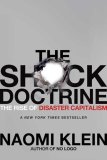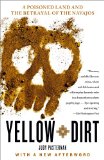Summary | Excerpt | Reviews | Beyond the book | Read-Alikes | Genres & Themes | Author Bio

Critics' Opinion:
Readers' Opinion:
First Published:
Sep 2007, 576 pages
Paperback:
Jun 2008, 576 pages
 Book Reviewed by:
Book Reviewed by:
Amy Reading
Buy This Book
If, as the critics have said, Naomi
Klein's first book,
No Logo, is the bible of the
anti-globalization movement, then The Shock
Doctrine is its Tacitus, its Herodotus, its
Gibbon: the recent history behind global capitalism
and how we have arrived at the present moment. No
Logo brilliantly eviscerates the branding of
Western culture and the penetration of the market
into the public sphere; it is impossible to say
enough good things about that book. The Shock
Doctrine is a worthy successor, deepening the
perspective on globalism by identifying its ignoble
modus operandi—the shock doctrine, "orchestrated
raids on the public sphere in the wake of
catastrophic events, combined with the treatment of
disasters as exciting marketing opportunities."
Klein traces the roots of today's system to Milton
Friedman, the incredibly influential Nobel
Prize-winning economist who taught for decades at
the University of Chicago before moving to
Stanford's Hoover Institution. She credits him with
two innovations that have molded the world we
inherit today. The first is a fierce adherence to
the free market—guided by the triumvirate of
privatization, government deregulation, and deep
cuts to social spending—that outlasted the long
trend toward a Keynesian mixed economy that
dominated American policy since the New Deal. The
second, more specifically Friedmanesque idea is that
these policies require a crisis in order to
implement them, and that change should happen
swiftly to jolt the system into working order.
At the heart of the book is Klein's challenge to the
official history of the second half of the twentieth
century which says that free-market reforms and
democracy have marched hand in hand across the
globe. Instead, she demonstrates, over and over, how
Friedman's adherents have exploited and even helped
create disasters in order to push their reforms on
an unwilling citizenry, demolishing social
democratic nets for millions of people. In a truly
gripping story, Klein relates how Chicago School
economists seeded universities in Santiago with
their disciples, hoping to turn Chile into the first
laboratory for their policies. When Augusto Pinochet
overthrew Salvador Allende in 1973, the so-called
Chicago Boys handed the junta a ready-made
free-market plan which they'd authored in
collaboration with the CIA, a 500-page bible known
as "The Brick." Klein demonstrates that what is
usually described as a politically-motivated
military coup was just as much about economic reform
at the behest of American-based multinational
corporations and a few wealthy Chileans. Dissidents
were arrested, tortured, and disappeared with the
intent not only of removing key leaders but also of
destroying an entire leftist culture. The exact same
pattern repeated itself across the Southern Cone* in
Brazil, Uruguay, and Argentina. Klein then traces
the shock doctrine's steady progress throughout the
rest of the century, devoting a chapter each to the
bloody events in the Falklands, Poland, South
Africa, Russia, and China before arriving at the
present moment and the perfect commensuration
between homeland security and the corporatist
economy.
The Shock Doctrine is a highly polemical book
which, like all polemical books, will energize those
already inclined to agree with Klein and will be
quite easy for opponents to dismiss as exaggerated
or histrionic. Read this book if you've been
demoralized by the news from Sri Lanka after the
tsunami, Iraq after the invasion, and New Orleans
after the hurricane. The Shock Doctrine will
give you a surprisingly long historical perspective
from which to view the corruption and exploitation
that all three recent events have prompted. The
criticisms launched against Klein center on her
unbalanced, unremitting attack on capitalism as the
scourge of the planet. What these critics miss is
that Klein specifically aims her weaponry at
corporatism, the strand of capitalism that erases
the line between government and business by turning
over public wealth to private companies, thus
enriching a few and impoverishing the masses.
The hardest part of Klein's argument to swallow,
even for those sympathetic to her politics, will be
the parallel she draws between economic shock and
physical torture. The book begins with a graphic
account of the research of Ewen Cameron, a
CIA-funded psychiatrist who obliterated the minds of
his (unconsenting) patients with electroshock
therapy in the belief that he could rebuild
functional personalities after the slate had been
wiped clean. Cameron's work later became the basis
of the CIA's torture manuals used in the service of
right-wing coups across Latin America and, most
recently, at Guantánamo Bay. Yet Klein goes far
beyond simply pointing out that disaster capitalism
often relies on torture in order to deal with
dissidents. Instead she argues that disaster
capitalism and torture are the same thing—a
much more hard-hitting thesis.
Klein points out that torture is never truly about
gaining information, but rather about terrorizing
individuals and a nation in order to induce a blank
slate, free of resistance, upon which to build a new
society. Electroshock therapy is the "shock and awe"
of psychiatric treatments; disaster capitalism is
the electroshock of economic policies. Readers might
find this linguistic syllogism a bit too neat or
convenient. They might balk at the way Klein seems
to condemn capitalism by association; just because
some corrupt dictatorships have used torture to
implement free-market policies does not mean that
all forms of capitalism violate citizens' integrity.
But in fact the parallel stands if it is understood
as a kind of literary metaphor, an astonishing
similarity at the level of deep structure. Both
practices operate by the same logic and both are
doomed by the same flaws. Just as Ewen Cameron was
unsuccessful at remaking his patients into healthy
citizens, so too will disaster capitalism never
fully quench resistance and remake citizens into
obliging consumers.
The Shock Doctrine makes for compelling if
unsettling reading as it moves along with the
stealthy progress of a good conspiracy theory.
Klein's covert history of the last fifty years
delivers the shock of the new as it recasts familiar
events through her lens. It is not the inspiring
call-to-arms that No Logo is, but it does end
on a positive note. From the detritus of disaster
capitalism, Klein forecasts, will rise newly
shock-resistant societies that will take the tools
for building strong social institutions back into
their own hands.
*The geographical term Southern Cone refers to the areas of South America that are below the Tropic of Capricorn. This includes all of Argentina, Chile and Uruguay, southern parts of Brazil and, sometimes, Paraguay.
![]() This review was originally published in The BookBrowse Review in November 2007, and has been updated for the
June 2008 edition.
Click here to go to this issue.
This review was originally published in The BookBrowse Review in November 2007, and has been updated for the
June 2008 edition.
Click here to go to this issue.

If you liked The Shock Doctrine, try these:

by Judy Pasternak
Published 2011
Yellow Dirt offers readers a window into a dark chapter of modern history that still reverberates today, weaving the personal and the political into a tale of betrayal, of willful negligence, and, ultimately, of reckoning.

by Margaret MacMillan
Published 2010
Margaret MacMillan, an acclaimed historian and “great storyteller” (The New York Review of Books), explores here the many ways in which history – its values and dangers – affects us all, including how it is used and abused.





The Funeral Cryer by Wenyan Lu
Debut novelist Wenyan Lu brings us this witty yet profound story about one woman's midlife reawakening in contemporary rural China.
Your guide toexceptional books
BookBrowse seeks out and recommends the best in contemporary fiction and nonfiction—books that not only engage and entertain but also deepen our understanding of ourselves and the world around us.